
The post Here’s Why Ethereum is a superior Store of Wealth than Gold !  appeared first on Coinpedia - Fintech & Cryptocurreny News Media| Crypto Guide
After a recent inflow, the worldwide market cap has grown to $1.90 T, despite a 1.16 percent gain in value. Trading volume has decreased by more than 30% since the beginning of the year as the worldwide market size has shrunk.
The market’s market value has declined due to small but noticeable price drops across the top ten cryptocurrencies. Bitcoin, Ethereum, and the Binance cryptocurrency exchange have all experienced sharp drops in value.
ETH Price Action
The price of Ethereum has just recovered to a high of $3280. This rally broke through a psychological resistance level of $3000 as well as a long-term falling trendline. The Ethereum price, on the other hand, reverts to these levels to see if there is sufficient demand.
The 20-day DMA provided solid support for ETH.The daily RSI is struggling to stay in the bullish zone.In the case of ETH/USD, the intraday trading volume is $9.5 billion, suggesting a 31.2 percent drop.
It is now trading at $2860 down by 3.2% in the last 24 hours. The resistance levels are- $3000-$2900 and $2650 is the support incase of a downtrend.
Ethereum as a store of value?
Benjamin Cowen, a well-known cryptocurrency analyst, says he’s looking into Ethereum (ETH) to see if the main smart contract platform has what it takes to be a store of value.
Cowen believes that while many investors see gold as a store of value, the precious metal has remained nearly flat over the last decade, according to a new interview on the bitcoin channel InvestAnswers.
Since ETH’s value has increased about 50 times in the last year, the crypto analyst claims that Ethereum is a superior store of wealth than gold. The risk for drawdowns and lengthy consolidation periods are his caveats for storing capital in ETH.
He believes Ethereum, like Bitcoin, will rise in value over time, and the concept of’store of value’ applies as long as you have the correct time horizon and your definition of store value isn’t one that must constantly rise monotonically.

 3 years ago
240
3 years ago
240














 English (US) ·
English (US) ·